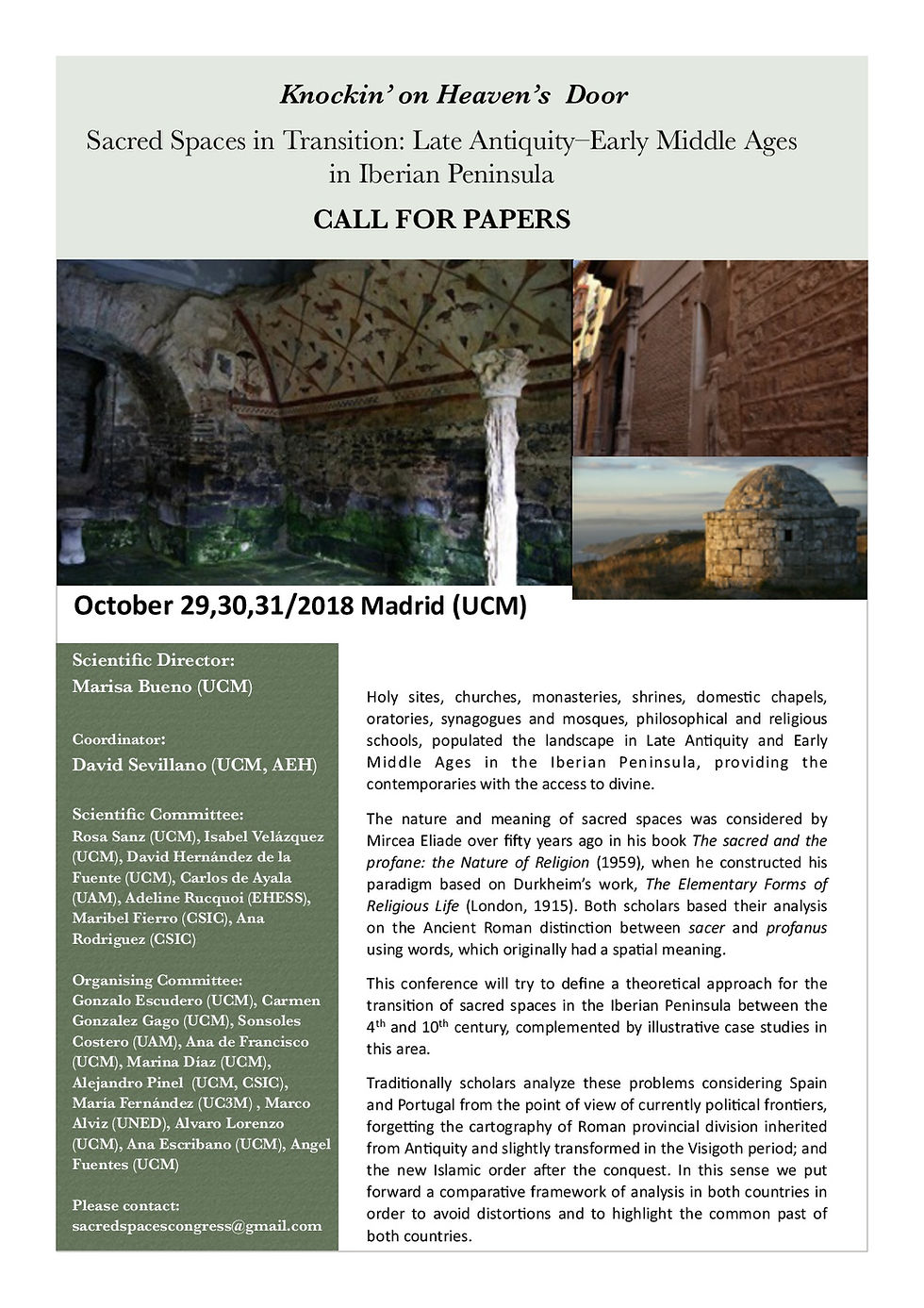CALL. 01.09.2018: "Knockin’ on Heaven’s Door". Sacred Spaces in Transition: Late Antiquity
- 14 jul 2018
- 3 Min. de lectura

FECHA LÍMITE/DEADLINE/SCADENZA: 01/09/2018
FECHA CONGRESO/CONGRESS DATE/DATA CONGRESSO: 29-30-31/10/2018
LUGAR/LOCATION/LUOGO: Facultad de Geografía e Historia, Universidad Complutense de Madrid (Madrid, Spain)
ORGANIZADOR/ORGANIZER/ORGANIZZATORE: David Sevillano (coord.) ; Gonzalo Escudero (UCM); Carmen Gonzalez Gago (UCM); Sonsoles Costero (UAM); Ana de Francisco (UCM); Marina Díaz (UCM); Alejandro Pinel (UCM, CSIC); María Fernández (UC3M); Marco Alviz (UNED); Alvaro Lorenzo (UCM); Ana Escribano (UCM); Angel Fuentes (UCM)
INFO: call - sacredspacescongress@gmail.com
Holy sites, churches, monasteries, shrines, domestic chapels, oratories, synagogues and mosques, philosophical and religious schools, populated the landscape in Late Antiquity and Early Middle Ages in the Iberian Peninsula, providing the contemporaries with the access to divine. The nature and meaning of sacred spaces was considered by Mircea Eliade over fifty years ago in his book The sacred and the profane: the Nature of Religion (1959), when he constructed his paradigm based on Durkheim’s work, The Elementary Forms of Religious Life (London, 1915). Both scholars based their analysis on the Ancient Roman distincion between sacer and profanus using words, which originally had a spacial meaning. This conference will try to define a theoretical approach for the transition of sacred spaces in the Iberian Peninsula between the 4th and 10th century, complemented by illustrative case studies in this area. Traditionally scholars analyze these problems considering Spain and Portugal from the point of view of currently political frontiers, forgeting the cartography of Roman provincial division inherited from Antiquity and slightly transformed in the Visigoth period; and the new Islamic order after the conquest. In this sense we put forward a comparative framework of analysis in both countries in order to avoid distorsions and to highlight the common past of both countries.
We have chosen a particular chronological framework, between the 4th and 10th centuries, breaking both the traditional framework of analysis of Late Antiquity and Early Middle Ages and the ideological and cultural frontier of the Islamic conquest, in order to establish the differences and similarities between the transformation of pagan sites by Christianity and the impact of Islamic rulers in the construction of new religious spaces. Taking a strongly interdisciplinary approach, this congress tackles these questions from the point of view of archaeology, architectural and art history, liturgy, literary sources, law, philosophy and history in order to consider the fundamental interaction between the sacred and the profane.
Likewise, this congress pay special atention to the role of Christianity and Islam in order to define political identities and reshape the rural and urban landscapes in the Iberian Peninsula. It is aimed to bring new interdisciplinary research methods and new models to present new views of sacrality on the construction of political religious landscapes. Authors are invited to submit papers on these topics:
1. Defining the concept of Holy in both, pagan- graeco-roman and monotheistic religions: Christian and Islamic religious and legal tradition. How were these sacred spaced defined?
2. How were these spaces created, used, recognized and transformed?
3. Analyzing the social and political role of sacred spaces in Iberian Peninsula. How these transitions have been interpreted by historiography?
4. Construction of sacred landscapes in Christianity and Islam. Transition from pagan to Christianity and from Christianity to Islam.
5. Synchronic process of transition to Christianity in the north of Iberian Peninsula and transition to Islam in the South in the same area in 9th and 10th centuries.
6. Buildings and rituals, liturgy: consacratio, resecratio.
7. Political change, new legal order and the ancient worship and sacred places.
Shorts papers are welcome:
There is space in the Conference program for a limited number of short, fiteen-minute papers. The Scientific Committee will approve these. The deadline for the submission of proposed papers is September 1st 2018.
The title of the proposal, as well as a 300-word abstract and a brief CV should be sent to the following e-mail address sacredspacescongress@gmail.com
Posters can also be proposed. Please send a brief description of proposed posters, plus CV, to the aforementioned e-mail address. The scientific results of this conference will be published in English with a relevant international academic publisher in the framework of research of different projects that share common interests : Barbaricum Group; Project EVA, “Virtuals Spaces for Alterity”, financed by CAM, 2017-T1/5650; (CITHARA), HAR2015-65649- C2-1-P and Proyect HAR2017-83613-C2-1-P, both financed by Programa Estatal de Fomento de la Inves3gación Cienjfica y Técnica de Excelencia (Ministerio de Ciencia, Innovación y Universidades), and the Project (DOCEMUS-CM) S2015/HUM-3377 financed by Comunidad de Madrid, all of them based at Complutense University of Madrid.
After their proposals are accepted, applicants will be requested to pay the registration fee, a small contribution for the Congress.
- Presentations, 50€
- Posters, 30€
We would be grateful if you could help spread this call for papers

Comentarios